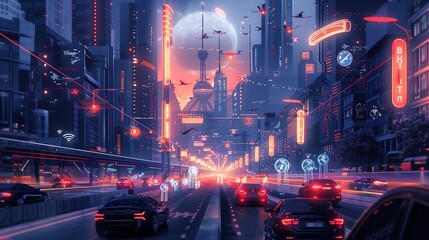Artificial Intelligence (AI) has become a driving force in various industries, and the music industry is no exception. The intersection of AI and music is creating unprecedented opportunities, challenging traditional norms, and opening up new avenues for creativity and business. From composition and production to distribution and consumption, AI is revolutionizing how music is made, shared, and experienced. This article delves into the various ways AI is influencing the music industry, highlighting both the benefits and potential challenges it brings.
AI in Music Composition and Production
One of the most fascinating aspects of AI in the music industry is its role in composition and production. Traditionally, music composition has been the domain of human creativity, relying on a deep understanding of melody, harmony, and rhythm. However, AI is now capable of composing music that is not only coherent but also emotionally resonant.
AI-driven software like OpenAI’s MuseNet and Google’s Magenta can generate entire pieces of music in various genres. These tools use machine learning algorithms to analyze vast amounts of music data, learning patterns and structures that they then replicate to create new compositions. For example, MuseNet can compose in the style of classical composers like Mozart or contemporary artists like Lady Gaga. This ability to emulate different styles offers musicians and producers a new tool for inspiration and experimentation.
In music production, AI is being used to enhance sound quality, mix tracks, and even master recordings. AI-powered tools like LANDR use machine learning algorithms to analyze a track’s audio and apply mastering techniques that enhance its quality. This democratizes access to professional-quality sound, allowing independent artists to compete with major labels in terms of production value.
However, the rise of AI in composition and production also raises questions about authorship and creativity. If an AI composes a piece of music, who owns the rights? And can AI truly replicate the human touch that makes music so personal and emotionally impactful? These are questions that the industry will need to address as AI continues to evolve.
Also Read: The Future of AI in the Automotive Industry: Safety, Efficiency, and Personalization
AI in Music Recommendation and Personalization
Another significant impact of AI in the music industry is in the area of music recommendation and personalization. Streaming platforms like Spotify, Apple Music, and Pandora rely heavily on AI algorithms to curate personalized playlists for their users. These algorithms analyze listening habits, preferences, and even contextual factors like time of day or location to recommend music that a user is likely to enjoy.
AI’s ability to analyze vast amounts of data allows these platforms to make highly accurate predictions about a user’s taste in music. This has led to a more personalized listening experience, where users can discover new artists and songs that they might not have encountered otherwise. For example, Spotify’s Discover Weekly playlist uses AI to analyze a user’s listening history and compare it with millions of other users to generate a custom playlist each week.
Personalization also extends to live music experiences. AI is being used to tailor concert setlists to the preferences of the audience. By analyzing data from previous concerts, social media activity, and streaming habits, AI can help artists choose songs that are likely to resonate with the crowd, creating a more engaging live experience.
While AI-driven personalization enhances the user experience, it also raises concerns about the impact on diversity in music consumption. If AI algorithms prioritize familiar or popular tracks, lesser-known artists might struggle to gain visibility. The industry will need to find a balance between personalization and promoting musical diversity to ensure that all artists have an opportunity to reach their audience.
AI in Music Distribution and Marketing
AI is also transforming the way music is distributed and marketed. In the digital age, music distribution has shifted from physical formats like CDs and vinyl to online streaming and downloads. AI is playing a crucial role in optimizing this distribution process, ensuring that music reaches the right audience at the right time.
AI-driven distribution platforms like Amper Music and Aiva use machine learning to analyze trends and predict which genres or styles are likely to be popular in the near future. This allows artists and labels to make informed decisions about when and where to release their music, maximizing their chances of success.
In marketing, AI is being used to create highly targeted campaigns that reach specific demographics. By analyzing data from social media, streaming platforms, and other online sources, AI can identify potential fans and tailor marketing messages to their preferences. For example, AI can help determine the best time to release a music video or launch a social media campaign based on when the target audience is most active online.
AI is also being used to enhance the visual aspect of music marketing. Tools like Jukin Media use AI to analyze and curate user-generated content, identifying the most engaging videos that can be used in promotional campaigns. This not only saves time and resources but also ensures that the content resonates with the target audience.
However, the use of AI in distribution and marketing also presents challenges. There is a risk that AI-driven strategies could lead to a homogenization of music, where only certain styles or genres are promoted because they are deemed more marketable. The industry will need to ensure that AI is used to support a diverse range of artists and styles, rather than reinforcing existing trends.
AI in Music Creation and Collaboration
AI is not just a tool for solo composition or production; it is also enabling new forms of collaboration between artists and AI systems. This collaboration is opening up new creative possibilities, allowing artists to explore uncharted musical territories.
For example, AI can assist in the creation of music by generating ideas or providing feedback on compositions. Tools like Amper Music allow artists to input specific parameters, such as genre, tempo, and mood, and the AI generates a piece of music that fits those criteria. Artists can then use these AI-generated tracks as a starting point for further development, adding their own creative touches to make the music uniquely their own.
AI is also facilitating collaboration between artists who might not have otherwise worked together. By analyzing the musical styles of different artists, AI can suggest potential collaborations that might yield interesting results. This can lead to the creation of unique and innovative music that pushes the boundaries of traditional genres.
In addition to collaboration, AI is enabling new forms of interactive music creation. For example, AI-powered apps like Endel allow users to create personalized soundscapes based on their mood, activity, or environment. These soundscapes are generated in real-time, responding to the user’s inputs and creating a dynamic and immersive musical experience.
While AI-driven collaboration and creation offer exciting possibilities, they also raise questions about the role of the artist in the creative process. If AI is heavily involved in the creation of a piece of music, who can claim authorship? And how does this collaboration impact the traditional notion of artistic expression? These are important considerations as AI continues to play a larger role in music creation.
Challenges and Ethical Considerations of AI in the Music Industry
The integration of AI into the music industry is not without its challenges and ethical considerations. As AI becomes more prevalent, issues related to copyright, authorship, and the potential loss of human creativity come to the forefront.
One of the primary concerns is the question of authorship. When AI composes or produces music, determining who owns the rights to that music becomes complex. Traditionally, copyright is granted to the creator of a work, but in the case of AI-generated music, the lines are blurred. Should the AI be considered the creator, or does the credit go to the human who programmed the AI or provided the input parameters? The industry will need to establish clear guidelines to address these issues.
Another ethical consideration is the potential impact of AI on human creativity. While AI can generate music that is technically proficient and even emotionally resonant, it lacks the lived experiences and emotions that drive human creativity. There is a concern that as AI becomes more capable of producing music, it could diminish the value of human-created music, leading to a homogenization of musical styles.
Additionally, the use of AI in music recommendation and personalization raises concerns about data privacy. AI algorithms rely on vast amounts of personal data to make accurate recommendations, and there is a risk that this data could be misused or mishandled. Ensuring that user data is protected and used ethically is crucial as AI continues to shape the music industry.
Finally, there is the question of accessibility. While AI-driven tools can democratize access to music creation and production, they can also widen the gap between those who have access to these technologies and those who do not. Ensuring that AI tools are accessible to all artists, regardless of their financial or technical resources, is essential to promoting diversity and inclusivity in the music industry.
The Future of AI in the Music Industry
AI is undoubtedly transforming the music industry, offering new tools for composition, production, distribution, and marketing. It is enabling personalized listening experiences, facilitating collaboration between artists, and opening up new creative possibilities. However, as with any technological advancement, the integration of AI into the music industry comes with challenges and ethical considerations that must be addressed.
As AI continues to evolve, the music industry will need to strike a balance between embracing the benefits of AI and preserving the human touch that makes music so special. By doing so, the industry can harness the power of AI to enhance creativity, promote diversity, and create a more inclusive and innovative musical landscape. The future of music is undoubtedly intertwined with AI, and the possibilities are as limitless as the imagination of those who create it.













